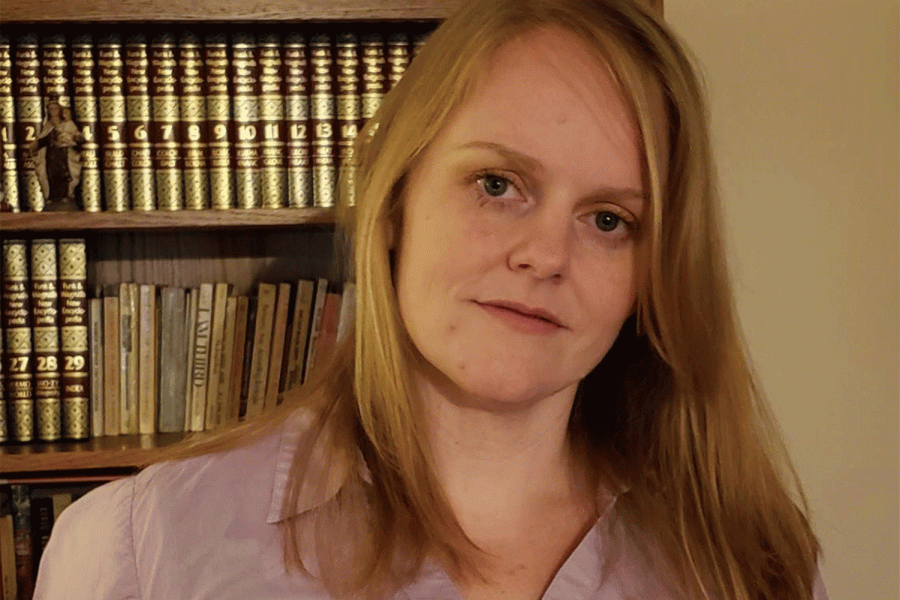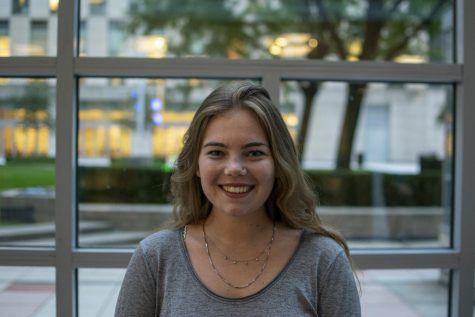Woman Reignites Claims of Sexual Assault by a Fordham Alum
After nearly a decade, she hopes to see change in the handling of abuse by the Catholic Church
COURTESY OF ESTHER HARBER
Harber claims she was raped by the Reverend Edwin Erhimeyoma in 2010. At the time of the assault, Rev. Erhimeyoma was pursuing a doctoral degree at Fordham’s Graduate School of Religion and Religious Education, which he completed in 2015. Harber hopes that, by sharing her story, necessary change will be made to the Catholic Church and the way it supports victims of sexual assault.
August 15, 2019
Esther Harber claims she was sexually assaulted nine years ago by Fr. Edwin Erhimeyoma, a priest pursuing his doctoral degree at Fordham University. After years of attempting to resolve the issue within the Catholic Church, Harber hopes that sharing her story will lead to changes she believes are needed in the way the Catholic Church supports victims of sexual assault.
Harber’s story was shared publicly in a recent interview published by the Catholic News Agency (CNA) in May 2019. In the interview, she explained she met Erhimeyoma in 2010 while working as a lay missionary serving women and children in New York. Erhimeyoma was a priest at Holy Rosary Parish, a church in the Bronx, which Harber often visited for both mass and her missionary work.
Over the next two years, the two engaged in what Harber calls an abusive relationship, which alegedly included an incident of rape in 2010. The university says it only recently learned of the allegations against Erhimeyoma, who was a student of the Graduate School of Religion and Religious Education, through Harber’s interview with the CNA.
“I do not use the word ‘predator’ lightly,” Harber told The Observer, “but that precisely describes his behavior.”
According to Harber’s recollection of the events, Erhimeyoma inappropriately touched her on two occasions in 2010, once during the sacrament of confession and a second time during a private appointment in his office. Harber claims that, following these two meetings, she was raped by Erhimeyoma in the nave of the parish.
She believes that Erhimeyoma took advantage of her emotional vulnerability during this time in her life to order to manipulate and ultimately sexually assault her.
Haber also said that Erhimeyoma sent her text messages calling her “sweetheart” and said that he loved her. He also referred to her as “vanilla”, an apparent reference to her skin color, which Harber said made her feel like she was being treated as trophy. Harber now believes that Erhimeyoma’s behavior was likely an attempt to “groom” her into emotional dependency, a term used by psychologists to describe how abusers isolate and control their victims.
The National Center for Research on Crime reported that, while sexual perpetrators can target anyone, they often find victims with vulnerabilities, such as a fear of abandonment. This allows them to establish power hierarchies where their victim becomes emotionally dependent on them, and are therefore less able to take action to end the abusive cycle.
Despite understanding how unhealthy the relationship was, Harber said she was unable to leave.
“I had tried unsuccessfully to ‘break up’ with him many times, but ended up back in that relationship,” she said. “I imagine it is a bit like a domestic violence situation — when it is extremely difficult for a victim to leave the abuser. I knew I needed to burn that bridge.”
In her interview with CNA, Harber explained her decision to meet with Erhimeyoma at the parish, despite the two incidents that made her uncomfortable in the past. When dealing with a particularly difficult rejection, she asked to meet Erhimeyoma at the parish in October 2010. Although she was concerned about his potential behavior, she says she needed the support of a friend and hoped the religious setting would deter him from any sexual advances.
Instead, Erhimeyoma allegedly tried to undress her and demanded that she perform a sex act, which Harber said she refused. Harber told CNA that Erhimeyoma then raped her on the floor of the church.
“The next thing I know,” she told the CNA, “I was flipped over, my face was on the floor.”
After the alleged assault, Harber said she asked the priest not to contact her for nine days while she prayed and fasted.
In order to report the assault to the church, Harber said she had to wait three weeks for an appointment with Monsignor William Belford, vicar of priests, and Father Thomas D’Angelo, the supervisor of foreign priests. Harber told CNA that she did not use the word “rape” in these meetings, but she believed her emphasis on the abusive nature of the relationship and the forcefulness of the sexual encounter warranted serious concern.
Harber explained to CNA that the Archdiocese of New York chose to focus on removing Erhimeyoma from the parish — and told her to stay away from the community until he had left. She now believes that the officials should have immediately assisted her in contacting the police. According to information the Archdiocese of New York gave to CNA, Erhimeyoma did admit to the encounter when asked by Monsignor Belford. Following the admission, the Archdiocese of New York withdrew him from their facilities and told him to return to Nigeria.
The Observer reached out to Erhimeyoma but did not receive a comment. While he admitted to CNA that he did have a relationship with Harber, he claimed he never assaulted her.
Bob Howe, assistant vice president of communications for Fordham University confirmed to The Observer that the allegations against Erhimeyoma were not shared with Fordham until this year, with the release of the CNA interview. He also confirmed that there were no breaks in Erhimeyoma’s time at Fordham, as the program he was enrolled in allowed him to continue his work from Nigeria. Erhimeyoma completed his degree in 2015.
Harber claims that Erhimeyoma contacted her from Nigeria via online messaging and requested that she tell the Cardinal that she lied about the assault.
Harber told CNA that in the years following the priest’s removal from New York, members of the Archdiocese continued to provide support for her but never pursued any legal action against Erhimeyoma. Reflecting on the incident and the way it was handled by the Archdiocese, Harber said she believes that the clergy members seemed uncertain about how to appropriately address the assault or how to engage with her.
In the Summer of 2018, Harber, then living in Cincinnati, heard news of the Theodore McCarrick sexual abuse scandal, in which McCarrick was removed from priesthood after sexually abusing multiple individuals over the course of several decades. Harber, inspired by the courage of those who spoke out against McCarrick and the action taken by the Church in this case, decided to take up the allegations against Erhimeyoma again.
She does not believe that she will ever achieve justice, stating that there is no way to return what Erhimeyoma took from her.
“My goal is not justice, but rather to protect others from falling prey to this predator,” she said.
Wanting to take action, Harber wrote to her Archbishop in Cincinnati, who then forwarded the letter to the Archdiocese of New York. However, third degree rape charges have a statute of limitations of five years, meaning that Harber’s case had expired in 2015.
In the months after receiving the letter, Timothy Cardinal Dolan, the current archbishop of New York, reached out to Harber for a meeting. Harber told CNA that this was the first moment she began to feel hope that the Archdiocese could learn from her experience and better protect people in the future.
During their meeting, the Cardinal directly apologized to Harber for the way that the Archdiocese had handled the case in 2010. Harber says that the Cardinal’s apology was incredibly meaningful to her.
Yet Harber only considers the meeting only a partial success.
In their meeting, Harber raised her concerns that the Archdiocese of New York does not subject foreign-born priests to the rigorous psychological screenings that are routine for U.S.-born priests who want to serve.
If the screenings had been in place, “I may not have been raped,” said Harber, believing that this decision was a “grave error on the part of the diocese.” Harber told CNA that she believes Dolan “brushed over” this point during their conversation.
Further, Harber noted that although the church takes sexual crimes committed against children seriously, there is not an appropriate avenue for adults seeking justice. Dolan told Harber that he planned to discuss this at the annual United States Conference of Catholic Bishops conference.
At the conference, which took place on June 11, 2019, bishops voted for the creation of a third party service for survivors to report abuse and passed three more protocols aimed to increase bishop accountability.
Harber said that while she is glad to see these changes, she believes that the Church missed the opportunity to prevent individuals from falling subject to the power dynamics in these relationships.
She noted how psychologists who have sex with their patients permenantly lose their licenses due to the inherent power hiearchy of the relationship.
“How much more of a power differential is there between a priest and a parishioner,” asked Harber, “to whom the priest represents a spiritual father and stands in the person of Christ?”
She believes that the Church’s decision not to address this point hinders avenues for victims to overcome the emotional hierarchy of such relationships, and is representative of how little is truly changing within the Church — despite the new policies being put into place.
After Harber’s meeting with Dolan, Harber told CNA that the Cardinal promised to contact Erhimeyoma’s priest in Nigeria and to further assist with the cost of her therapy.
According to the diocese of Warri, Nigeria, Erhimeyoma is currently under investigation for these charges — yet Harber says it is unclear what this means. Although the dicoese told CNA that Erhimeyoma is not a pastor, their website still lists him as an active pastor and dean. The Diocese of Warri did not respond to The Observer for a comment.
Harber says that she has forgiven Erhimeyoma and does not want to seek punitive measures, but that she does want to ensure the protection of others in the future. Ultimately, she wants Erhimeyoma to be removed from the clerical state and to come to repentance.
Now, even after this experience, Harber emphasizes that she still loves the Church. She says she tries to remind herself that the Church, and that Christ, is much bigger than any cardinal, bishop or malfunction.
“We need the Church,” said Harber, “and the Church needs us.”
Harber’s initial interview with JD Flynn of the Catholic News Agency was cited frequently throughout this article. Read the original article here.
A previous version of this article was published on July 2, 2019 that contained inaccuracies in the way events were framed. This version was removed from The Observer’s website on the morning of July 3, 2019.
The current version of this article reflects the events as they are understood by the reporting of Harber’s story.













Peter • Jan 6, 2020 at 3:29 am
miss Harber would have let know of the incident that occurred 2010, while now..? she would have raise this allegation at the early age.